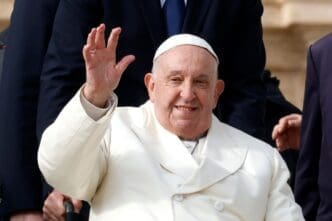As the world mourns the passing of Pope Francis, who died on Monday, his legacy is remembered not only for his leadership but also for his informal and engaging communication style. Known for blending his native Spanish with Italian, the pontiff often crafted phrases that resonated with people across the globe.
Upon his election as pope on March 13, 2013, Francis greeted the world with a simple yet heartfelt, “Brothers and sisters, good evening!” His words marked the beginning of a papacy characterized by calls for compassion and inclusivity.
Early in his tenure, Francis emphasized the importance of remembering the poor, inspired by Cardinal Claudio Hummes. This inspiration led him to adopt the name Francis, in honor of Saint Francis of Assisi, the man of peace. His vision was for a Church that aligns with the needs of the impoverished.
In his first Angelus prayer on March 17, 2013, Francis expressed a profound appreciation for mercy, describing it as transformative. He conveyed that a little mercy can make the world less cold and more just, underscoring the value he placed on empathy and kindness.
Meeting Emeritus Pope Benedict XVI for the first time after his election, Francis reaffirmed unity with the words, “We are brothers.” This sentiment echoed during his historic meeting with Patriarch Kirill, leader of the Russian Orthodox Church, in Havana on February 13, 2016.
Francis’ papacy also signaled a more open stance toward the LGBTQ+ community, famously stating, “Who am I to judge?” in response to a question about a gay priest. This comment reflected a shift towards greater acceptance within the Church.
Discussing the sacraments, the pope reminded priests that the confessional should be a place of mercy, not judgment, and emphasized the Eucharist as nourishment for the weak, rather than a reward for perfection, as outlined in his encyclical “Amoris Laetitia” on April 8, 2016.
His efforts to bridge religious divides were evident when he met Sheikh Ahmed al-Tayeb of Al-Azhar on May 23, 2016, symbolizing reconciliation between Christianity and Islam after a period of strained relations.
Francis often faced criticism, especially from conservative circles in the United States. Regarding this, he once quipped that it was an honor if Americans were critical of him, highlighting his resilience against opposition.
During the coronavirus pandemic, he addressed the shared human experience, expressing that everyone is in the same boat, fragile yet essential, emphasizing the importance of mutual support and comfort in times of crisis.
In Maskwacis, Alberta, on July 25, 2022, Francis extended an apology to Indigenous peoples for the Church’s role in cultural destruction and forced assimilation, particularly in Canada’s residential school system, acknowledging past wrongs.
Pope Francis also shared humorous reflections on his homeland, Argentina, noting the country’s abundance of resources coupled with the unique challenges posed by its people, adding a touch of humility and humor to his discussions.
Addressing the criminalization of homosexuality in certain countries, he firmly stated, “Being homosexual is not a crime,” advocating for the dignity and rights of the LGBTQ+ community during a January 24, 2023 interview.








